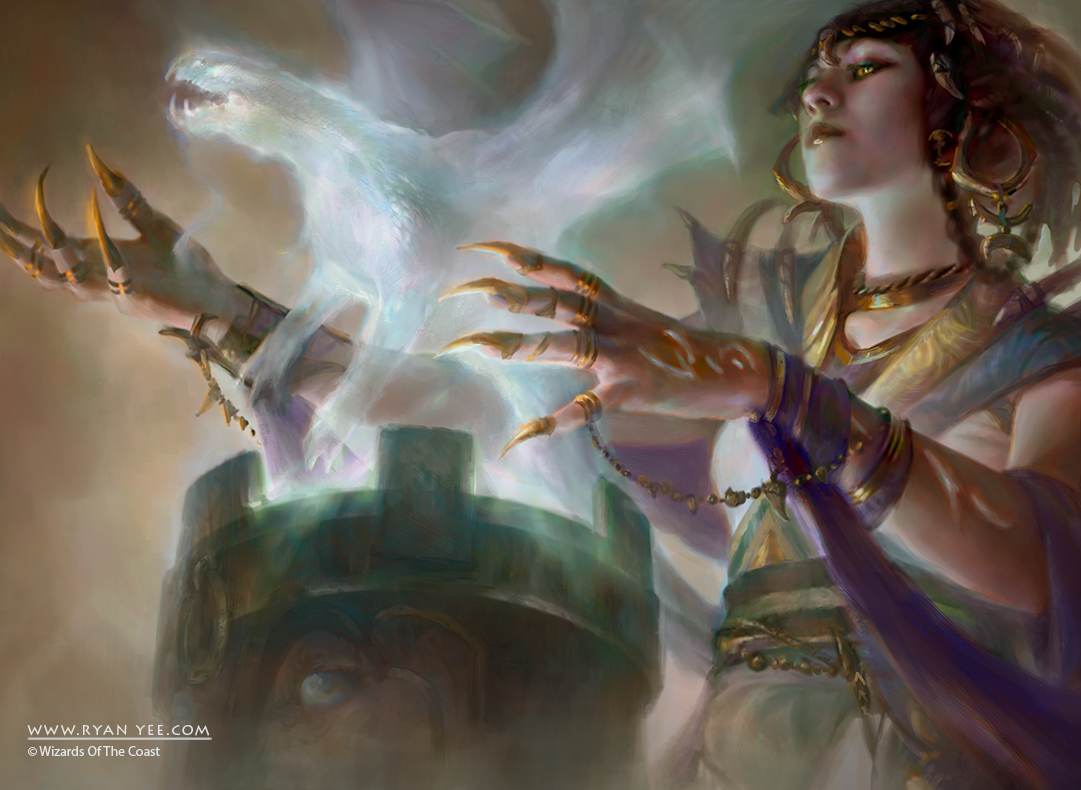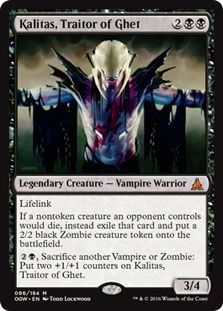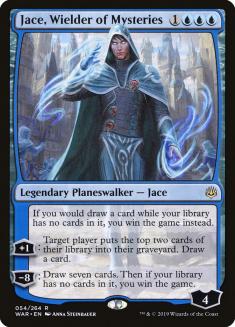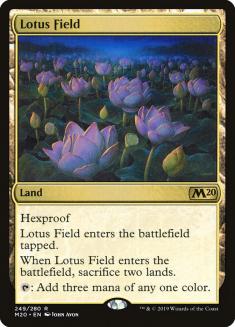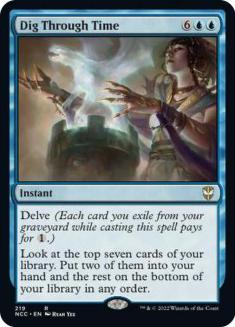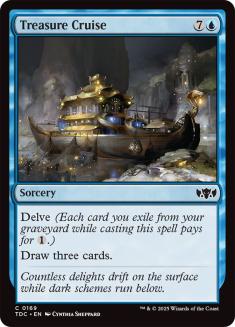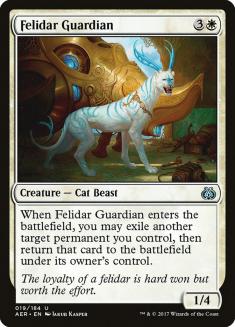Earlier this week, Ross Merriam wrote an article about why Wizards of the Coast (WotC) was correct in leaving the Pioneer Banned and Restricted list as is.
You should read it, because if you don’t, very little of what I’m about to say will make sense. I think this process is healthy for finding a balance in format management. Banning cards should be a last resort. And while Ross might be happy that Pioneer wasn’t hit with any sort of ban, I am firmly in the other camp.
Ross is a pretty smart guy who makes a lot of good points. I don’t want anyone to think otherwise, regardless of how fervently I disagree with his positions here. I pride myself on trying out different decks almost every Magic Online (MTGO) League, and seeing how games play out from a variety of angles. My experience playing these different decks against Dimir Inverter gives me a unique perspective and insight into the problems that the deck causes.
But enough about that. Let’s get to the heart of the matter.
Dimir Inverter Has Been Dominant
By any metrics other than the hidden information that has been gathered via Magic Online, Dimir Inverter has well and truly crushed every major live tournament since its debut. It dominated Players Tour Nagoya, and one week later it won Players Tour Phoenix. Part of this is due to the better players picking it up for themselves instead of trying to beat it. You must also understand that the “best deck” is often exactly that because it has the best win percentage against the rest of the field. Even if your deck crushes it, who cares? You’ll lose a ton of percentage points against the non-Dimir Inverter opponents. That makes choosing any other deck, even one that beats Dimir Inverter, an inferior choice.
Creatures (8)
Planeswalkers (3)
Lands (25)
Spells (24)

But there are a lot of adaptations that existing Pioneer decks can and have gone through in order to defeat Dimir Inverter. You can’t ignore that the deck seems to get better when the best players in the room are playing it. They just don’t lose! Yes, they’re tuning their version to be the best, but it’s also putting an incredible amount of strain on the rest of the format to interact with it, which in turn makes them weaker against the rest of the field. That, in my opinion, is how you start to “warp” the metagame.
There’s a breaking point in deckbuilding where you can warp your deck to beat a specific enemy, but the cost is usually too high. Decks like Dredge need four or more sideboard cards for you to have a chance at winning. With Dimir Inverter, it’s more like you need ten cards in your overall strategy that interact favorably, while putting them under immense pressure, and then you need to dodge getting clowned by Kalitas, Traitor of Ghet.
The problem with Dimir Inverter, in my mind, is that you sacrifice very little in order to actually play the combo. At the last Pioneer Open I attended, one of my opponents cast a bunch of Dimir cards but ultimately killed me with one copy of The Scarab God in the first game. I didn’t see an Inverter of Truth, but I saw all the other stuff: Fatal Push, Thought Erasure, Thoughtseize, Dig Through Time, and a bunch of other efficient ways to interact or disrupt the opponent. It wasn’t until I saw roughly 40 cards in Game 2 that I realized he wasn’t even playing Inverter of Truth. It’s effortless to play the combo, while it takes playing a very specific subset of cards in order to interact with Dimir Inverter, let alone beat them.
And that’s the rub. It’s not that the combo is too good. Killing your opponent on the fifth turn with a combo deck is reasonable, if not a bit slower than normal. But the kicker is that you’re not actually just killing on the fifth turn. You’re killing on the fifth turn, regularly, while casting Thoughtseize, Fatal Push, and other forms of interaction. You’re a Dimir Control deck that just gets to play a combo finish. Traditionally, I’ve been a fan of decks like this, but I was told about three years ago that they were too good for Modern, so why in the hell is this okay for Pioneer?
But back to the point at hand: is Dimir Inverter dominant? If the data is to be believed, the deck’s overall win percentage is roughly 49%. That’s not very good. But as someone who picked up the deck and played a few leagues, who has a ton of experience with the likes of Splinter Twin and other combo/control strats, let me be the first to say that the deck has a huge learning curve. The first time you play it, you use Jace, Wielder of Mysteries on yourself to fuel Dig Through Time. In actuality, you end up having too big of a graveyard and can’t actually kill your opponent with Inverter of Truth. You should, usually, target your opponent.
The learning curve while goldfishing Dimir Inverter is already hard, but factor in trying to play around Ipnu Rivulet, Collective Defiance, and a whirlwind of counter and discard effects and you have something that’s truly too difficult for a newer player to master. Sure, anyone could pick it up and go 3-2 in a League after a few tries. Those are mostly due to the freebie games that you win via Inverter of Truth into another combo piece on the fifth turn. That draw happens quite a bit, and is really tough for some decks to beat because you need a very specific type of interaction.
But for every live Pioneer tournament that’s happened since Theros Beyond Death was printed, Dimir Inverter has crushed the competition. The best players in the room gravitate toward it because it gives them free wins against the worst players in the room. Taking away that “wow” factor by beating someone who is better than you does a huge disservice to what draws many people to the game in the first place. On any given day, within any given format, you can beat Jon Finkel. While you won’t do it much, the best players in the world still only win about 70% of the time. With Dimir Inverter, I think the win percentage against a newer player would be closer to 90%.
Dimir Inverter Has Interesting Gameplay… Sometimes
This part of Ross’s argument had me really thinking about all the games I’ve played against Inverter, and I have to say that I am somewhat on the same page here. Some games against Inverter are a lot of fun. Those games involve countering or discarding your opponent’s threats while they fumble around trying to hit land drops and resolve Dig Through Time. However, for every two good games you have against Dimir Inverter, you have at least one where your opponent just hard-combos you while killing your stuff and making you discard up the curve.
Trying to fight the actual combo is really tough at times, because killing Inverter of Truth doesn’t actually do anything. Killing Thassa’s Oracle with the trigger on the stack doesn’t do anything. Killing Jace with the draw ability on the stack is actually pretty tough. Like with Splinter Twin before it, the onus of interaction is purely on the opponent, because you will almost certainly win every game with Dimir Inverter where your opponent doesn’t go super-fast under your combo or systematically dismantle you.
I’ve also had games where nothing I did mattered. No spell I cast or sequence I made could have possibly made a single bit of difference. It’s not like the hands I kept were bad. In fact, I think keeping a wide range of hands against decks with discard like Thoughtseize is important. Thoughtseize gains a lot of strength when you pair it with a combo deck, which might be one of the reasons people keep popping up in my chat asking me if Thoughtseize should be banned!
You see, new players don’t see the nuance of a good match against Dimir Inverter. They see their best spells disappearing in front of their eyes. They see the opponent kill and counter and discard everything they’re trying to do. Then they see their opponent cast Dig Through Time and kill them with the two cards they find from it. That’s the snapshot you left them with at the table. That’s the picture they’re going to carry around for the rest of that tournament. That’s the feeling they’re going to have every time they see someone lead with Choked Estuary.
No one remembers every part of the fun games of Magic they play, but you can bet they remember every single turn of that five-turn stretch where they felt hopeless, and where no actual game was played.
On top of that, a lot of games I’ve recently played against Dimir Inverter are unfun in the other way. The best way to beat Dimir Inverter is to reduce the number of turns they get to find their combo. Restricting the number of relevant turns from six to four is how you get a leg up. As Ross mentioned multiple times, aggressive decks that go under Dimir Inverter can cause problems. The initial builds were all great at stifling that early aggression thanks to efficient removal like Fatal Push. I’ve figured out ways to go even lower, and my record in the matchup has increased dramatically as a result.
The other way to beat Dimir Inverter the “easy way” is to just deck them. Play some card like Ipnu Rivulet or Collective Defiance and just cheese your opponent for trying to assemble some weird combo. To me, those “gotcha” moments are only fun the first time. After a while, they become the norm, and you start having one game per match that just ends because you cast some weird card in your deck.
It can be beaten, but defeating that enemy comes at a major cost, both in terms of restricting types of gameplay and deckbuilding. Chonky Red, one of the better decks in Pioneer before Theros Beyond Death, all but disappeared with the advent of this new combo deck. It says a lot to me about the health of Pioneer, and the type of games you can expect to play, when a card like Glorybringer goes from being a Top 5 spell to unplayable. But that’s exactly what happened, because the card sure does the same thing it did two months ago.
Does Dimir Inverter have more interesting gameplay than Lotus Breach? Definitely. If I had to ban any one card in Pioneer, I would gladly choose Lotus Field because it promotes a type of Magic that I despise. “Twiddle” Magic, or decks that just draw cards and generate a ton of mana only to kill you in some big flourish, are extremely boring to me. Dimir Inverter is quite the opposite. It doesn’t steal time from you. It doesn’t kill you in some weird way that involves having you sit there for twenty minutes, unable to interact but with a faint hope that your opponent fizzles somehow. It kills you in some other weird way that we haven’t really seen before.
Ban Fatigue
I wrote a bit last week about the impact that banning cards has on any format, and on the confidence of us consumers. I have people asking me all the time what decks they think they should invest in to dodge bans while still being competitive. Having your player base assume a ban is coming for their deck because it’s too good is troubling. It’s no surprise that people are flocking to borrow services for MTGO. Who can blame them? They don’t want their cards to become worthless next month.
With the beginning of Pioneer, banning cards was a given. However, things have leveled out, so now we need some serious proof before we ban cards so that we don’t invalidate someone’s deck. My article last week went over a great way to hurt Dimir Inverter without killing it – ban Dig Through Time.
I want Inverter of Truth to exist because I think banning stuff every month is embarrassing. Some cards have a history of being too good, and Dig Through Time is one of them. Right now, it isn’t oppressive or showing up in record numbers. It is, however, an extremely powerful tool in what I consider to be the best deck in the format. Dig Through Time will only get better as the format grows. I love that card. I’ve cast it hundreds of times across multiple formats. But holy crap, it is way too good, even when using it in a fair way.
In some ways, I thought Treasure Cruise was the same, but it’s really only on par if you can pair it with stuff that turns extra land drops into virtual spells or actual spells. Cards like Brainstorm in Legacy made Treasure Cruise outrageous. Eventually, Treasure Cruise might need to be banned too.
These aren’t new cards or new problems. How many announcement Mondays have we woken up to where Dig Through Time was banned or restricted in some format? My recollection counts three but I bet the house it’s going to be four really soon.
I hate banning stuff, but I also understand that banning the right card is paramount. I don’t want to have this conversation. I wouldn’t have written this article six years ago. It wasn’t until these last few years that we’ve really seen a ramping up on power level. One deck or one card becomes oppressive, and invalidates the rest of the format. If you want the games to be fun or competitive, taking action is a necessary step to maintain format health.
It took me one match of playing with Oko, Thief of Crowns before realizing that the Elk ability should be a minus instead of a plus. I took one look at Underworld Breach and just didn’t believe it. My reaction to Wilderness Reclamation was one of befuddlement. This is not some new problem or something that can be fixed by flipping a switch. This is ingrained in the design process. I’m happy to see WotC trying new designs, but clearly there’s a blind spot that keeps getting exploited.
Ban a Little; Ban a Lot
At the format’s inception, Pioneer was a wild and wonderful place. It didn’t take long for us to find a lot of the broken cards, and I was very happy with their response time and reasoning behind their ban decisions. We knew that after a few months, WotC said they’d cool things down and they’ve done exactly that. I’ve been a champion of banning something out of Dimir Inverter because I hate the deck, but I also honestly think it’s too good in the right hands. Just like Matt Nass and Ironworks, Dimir Inverter is one of those decks that will only get better when the best players in the room are piloting it.
If they never ban something from Dimir Inverter, I think I’d be okay with that. I just want consistency. The Felidar Guardian ban made sense to me. Allowing Dimir Inverter to continue unfettered while Felidar Guardian sits on the B&R list just doesn’t make sense. Interacting with Felidar Guardian may be slightly easier, but the exchange tends to net the Felidar Guardian player an extra card. The speed and midrange nature of the archetype made it difficult to play against, however it was also checked by more forms of interaction. I’m not implying that a single Shock “beats” Felidar Combo. Rather, being able to interact with a combo on multiple axes makes it palatable.
Like Splinter Twin in Modern, Copy Cat could be broken up a number of different ways. Killing Felidar Guardian or Saheeli Rai got you there. Being able to deal one or two damage to the Saheeli Rai at instant speed kept you in the game. And on top of that, having discard and counterspells was good enough. Even a medium-sized Walking Ballista was enough to keep them from killing you on the spot! And don’t get me started about playing another combo deck that dodged their spot removal.
Is Copy Cat harder to beat than Dimir Inverter? No one cares and it doesn’t matter, because one is banned and the other isn’t. We’ll never know because they’re never unbanning Felidar Guardian, and for good reason. It was too good, and the opportunity cost of putting the combo in your deck was virtually nonexistent. The same is true for Dimir Inverter, which is the heart of my issue with the deck’s existence. Combo decks like Lotus Breach use their whole deck and sideboard to get the job done. Dimir Inverter uses between ten and twelve slots, and I’m not really sure it needs to play so many copies of Thassa’s Oracle or Jace, Wielder of Mysteries.
If you think Dig Through Time is a fine Magic card for Pioneer, that’s okay. I’ve had a lot of opposition to my opinions on this subject, which leads me to believe that a lot of strong players are having great results with the deck, and they’re not quite ready to let it go. And that’s okay too. Having your card or deck banned sucks a lot, and it’s the last thing I want for someone who is so invested in the game. Dig Through Time will only get worse and Dimir Inverter is an outrageous force in the right hands.
So, what do you think? Should Dimir Inverter be knocked down a peg?

